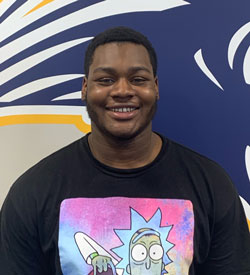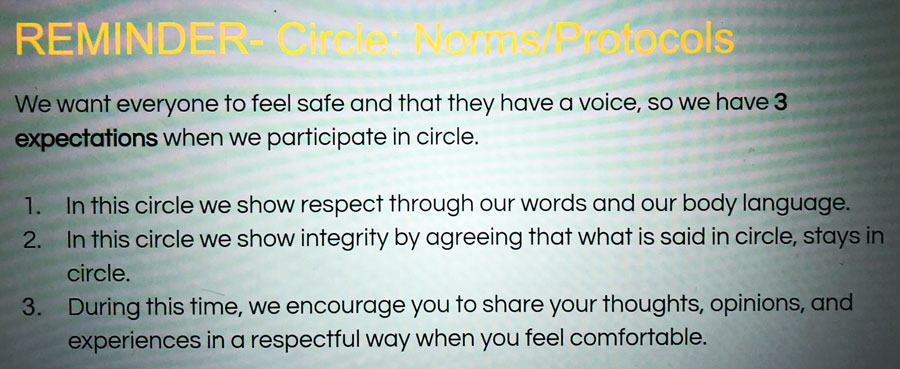Godwin Heights — At noon on Tuesdays, high school senior Jaquan Johnson switches on his computer to enter a Zoom meeting. He’s ready to talk and learn about important issues with his peers.
But this isn’t for a class. Jaquan will spend the next 45 minutes participating in the school’s Equity, Social Justice and Diversity Conversations, a program designed to offer a safe space where students and staff can discuss topics of racism and other issues impacting the Godwin community.
“I think it is needed,” Jaquan said. “Being able to learn and talk about stuff — what its effect has been — has really helped.”
Planning for Equity Conversations started two years ago as staff went through training focused on implicit bias and systematic racism, said Assistant Principal Mike Porco. Through that process, district leaders recognized that the diversity of its students was not reflected in its staff.
‘It’s breaking down those walls. The students interact on a deeper level than what they used to.’
— student Jaquan Johnson, on Equity Conversations
In the 2019-2020 school year, 52% of Godwin Heights High School students were Hispanic, 25% were African American, 14% white and 6% two or more races, as reported by MiSchoolData.org. Of the high school staff during the same year, 85% were white, 8% Hispanic and 7% African American.
“As a white male, there are things that I never have had to deal with as far as equity or being treated fairly,” Porco said. “For me to be able to provide those things for those students who have been around continuous racism, I have to be able to understand their point of view.”
Wishing to bridge that gap, the high school launched Equity Conversations just as the COVID-19 pandemic shut down schools in the spring of 2020. Despite this challenge, interest in the program grew and it continued into the summer.

The need for such conversations became even more apparent as the Black Lives Matter movement grew throughout the year. Students were looking for places to share their voices about national and global events and how such conflict impacts them personally, Porco said.
“We sometimes paint a picture of everything being happy and nice and go about our day,” Porco said. “Within that picture, we have an ideal of how someone should act or behave, and that is not true. By learning and identifying our own bias and its genesis, we can look at things differently.
“Looking through that different lens, as we hear the students’ voices, we begin to better understand where they are at and how to support them in their future.”
“It Still Happens”
Porco is one of four hosts of the Equity Conversations meetings. At the beginning of each meeting, he reviews the group’s guiding principles, which include respect, empathy, active listening, compassion, withholding judgment, patience and body-language awareness. Participants also have the opportunity to share good news before they dive into the topic of the day.
The key, according to Porco, is to make sure that everyone knows this is a safe space where they can freely share their thoughts and experiences.
“It has encouraged me to tell my side,” Jaquan said. “Racism is a big thing to talk about because it still happens year after year. It still happens among the students.
“Having a safe place to go and talk about the experiences you have had, you feel like your voice is being heard. I encourage students, especially freshmen and sophomores, to participate. I encourage them to open up and to share their story.”

A Change for the Better
Porco said programs like Equity Conversations have helped build better communication and understanding at the school. Because of the positive results, discussions regarding equity, social justice and racism have been added in the school’s advisory period, which meets twice a week.
It has also led to the administration reviewing and revising some policies, like head coverings, to better reflect the diverse culture of the school. Like many schools, Godwin Heights used to have a policy stating that students were not allowed to wear hats, skull caps or covers of any kind. This created a conflict as some cultures require head coverings to be worn.
“The concern was that, by allowing students to wear hats, they would be able to cheat,” Porco said. “In truth, when we eliminated that rule, (cheating) didn’t happen. So the rule was just really outdated.”
The school is also looking into the possibility of opening up the Equity Conversations gatherings to include family and community members, Porco said.
As a student, Jaquan said the positive changes he’s experienced at school go beyond just policy changes. Through Equity Conversations, he’s been able to build relationships with classmates he wouldn’t have otherwise met.
“It’s breaking down those walls,” said Jaquan. “The students interact on a deeper level than what they used to. They are not alone, but sharing with other students, starting conversations.
“It is something beyond just the core classes. Students need to share. They need to be heard.”









